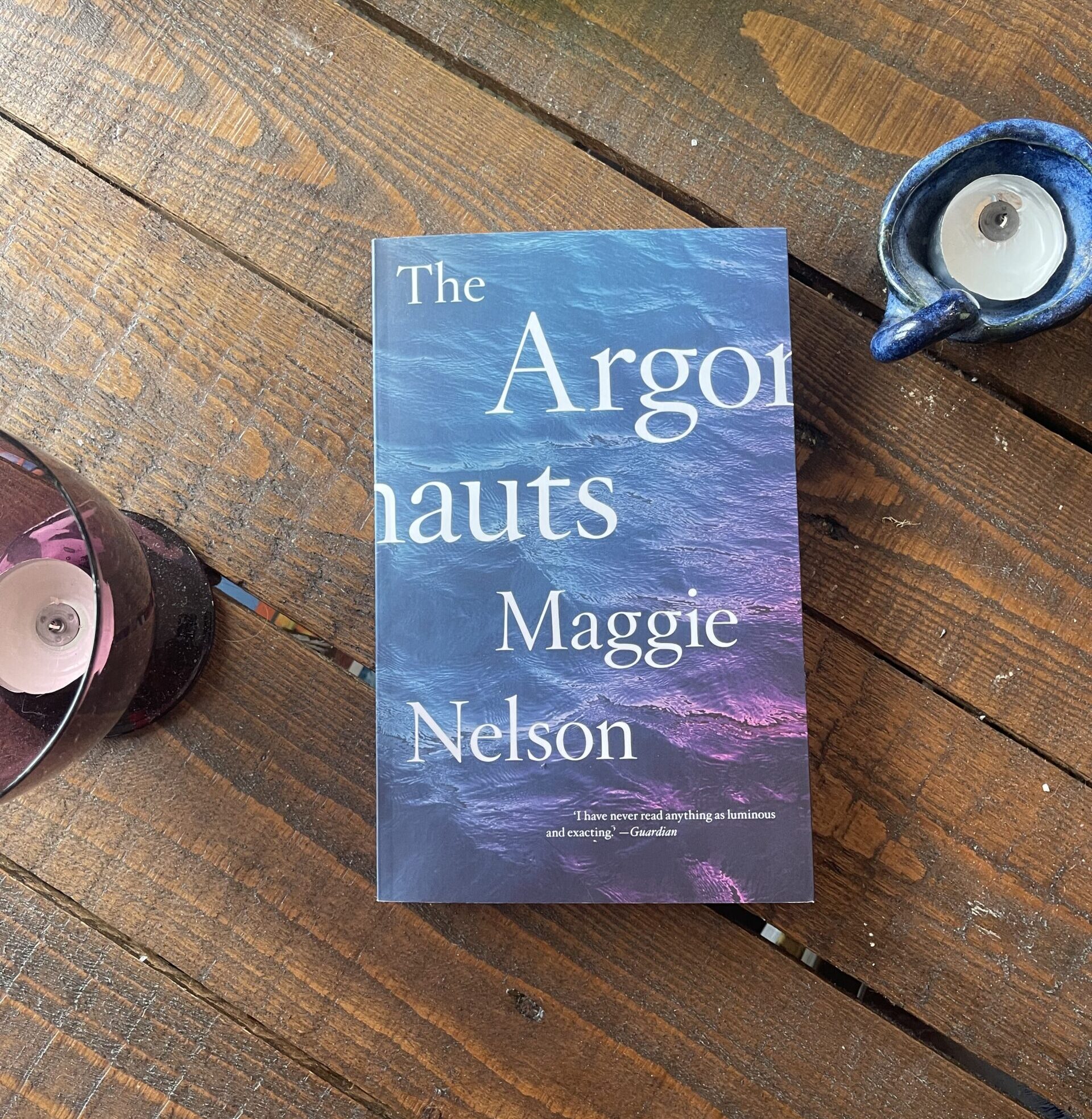This book was recommended to me by a friend who is known to take their sweet time when reading, so I was expecting to be able to get through it fairly quickly considering it’s 178 pages long. Now, while it didn’t take me months to get through, it was a bit of a slower read. Usually, if something takes me some time to tackle it’s a bad sign, typically indicating that I’m struggling to enjoy the plot/writing/characters etc.. For instance, I am still technically reading Anna Karenina, which I started in our first lockdown in 2020…
However, Maggie Nelson’s ‘The Argonauts’ is thoroughly enjoyable, it just takes some time to digest. My hand is on my heart when I say that I am not the kind of person who sits and thinks about what they’ve just read, be it a sentence, paragraph or entire novel. That’s not a veiled criticism of those who do, it’s just that I tend to enjoy reading as a more relaxing pastime. Especially when I was studying or working in quite a draining job, the last thing I wanted to do was sit down and think more, instead opting for generally more light-hearted or emotional reads. The Argonauts has proved the exception to the rule and, not only that, has convinced me that maybe I need to do some more thoughtful reading (granted, I am currently not working so that definitely factors into my ability to do this).
The book itself is non-fiction, and beyond that I don’t quite know how to categorise it. The Argonauts doesn’t fit neatly into one genre, instead combining elements of memoir, autobiography, essays and even poetry. I expect that this is intentional, as much of the content centres around what it means to ‘be’, and how others’ perceptions of us influence our capacity for ‘being’.
There are no chapters as such, Maggie Nelson opts to discourse through paragraph upon paragraph of beautiful written thoughts, memories, and responses to relevant literary and academic prose. She eloquently details aspects of her relationship with Harry, a gender-fluid artist, her own pregnancy with their child, and their approach to parenting their son and Harry’s child from a previous relationship. Nothing Nelson discusses is expressly unique, and in fact what is so striking about the book is her ability to weave such beautiful language in and around experiences that are in some ways so pedestrian.
I read this book on my phone (thank you Libby), yet I have since bought a physical copy as I wish to reread and annotate my favourite passages, so incredible is the writing. Nelson herself spends much of the time discussing language and writing, and whether words can suffice to express oneself. As a writer, she notes that she has spent much of her life “devoted to Wittgenstein’s idea that the inexpressible is contained – inexpressibly – in the expressed”. Essentially, words are good enough. Conversely, Nelson’s partner believes that language has limits in its ability to capture what we wish to express. The following is a quote from The Argonauts on their disagreement:
“Before long I learned that you had spent a lifetime equally devoted to the conviction that words are not good enough. Not only not good enough, but corrosive to all that is good, all that is real, all that is flow. We argued and argued on this account, full of fever, not malice. ONce we name something, you said, we can never see it the same way again. All that is unnamable falls away, gets lost, is murdered… I insisted that words did more than nominate.”
It is then reasonably posited that perhaps their attitude towards language and its restraints is somewhat reflective of their experiences of society as a whole. Nelson is a cisgendered white woman and while her sexuality and lifestyle choices may not be in line with the stereotypically-gendered notion of being a woman, we wonder if her relationship with language as a post-nominative tool is not much more easily developed than the relationship her genderfluid, male-presenting, legally female partner may develop. Notably, the quote above occurs on the 4th page of the book, and from then on we are following Nelson through, alongside many other discussions, her relationship with and attitude towards language as a form of self-expression.
Despite how I may have portrayed it so far, The Argonauts is not a stuffy intellectual book that dedicates itself to debating semantics. Nelson explores many topics in an interesting and provocative way. She talks about sex and sexuality, she talks about women and the way we have been presented throughout literary history, she talks about parenting, being a mother, and breastfeeding, and she talks about her life.
As you’ve probably guessed, this is not something that I would describe as an easy read; you probably can’t (or shouldn’t) whip through it in one weekend. This book is challenging, thought-simulating, intelligent, beautiful, at times confronting and it is 1000% worth giving a go. I’ve read quite a few books this year and this is definitely one of my favourites. Go grab it on Libby or borrow it from your local library, just don’t blame me if you end up going out again to buy another copy to keep.
Image | @AmeliasTrivialPursuits

